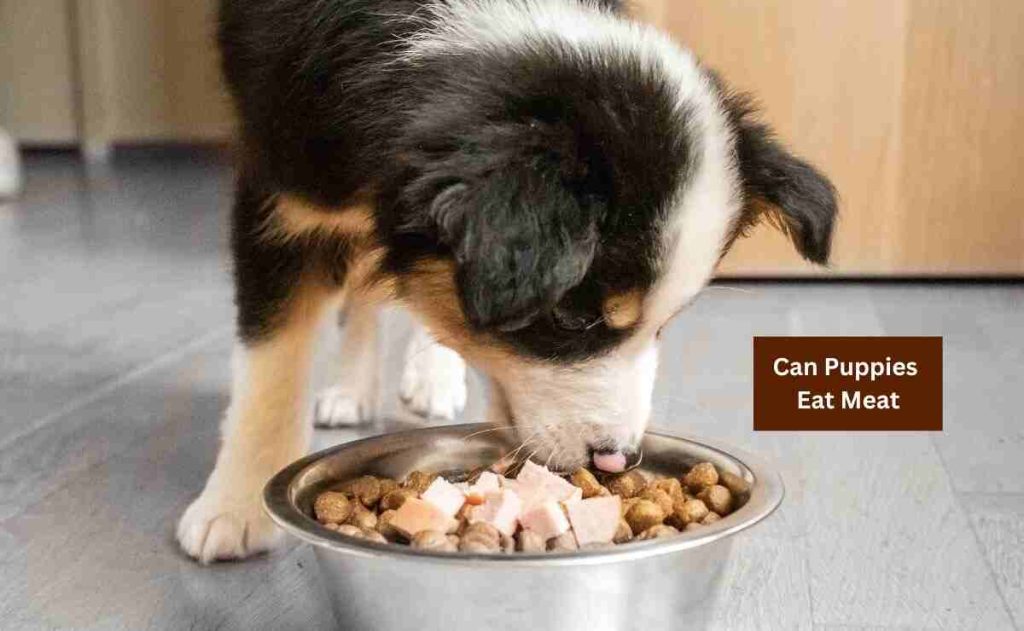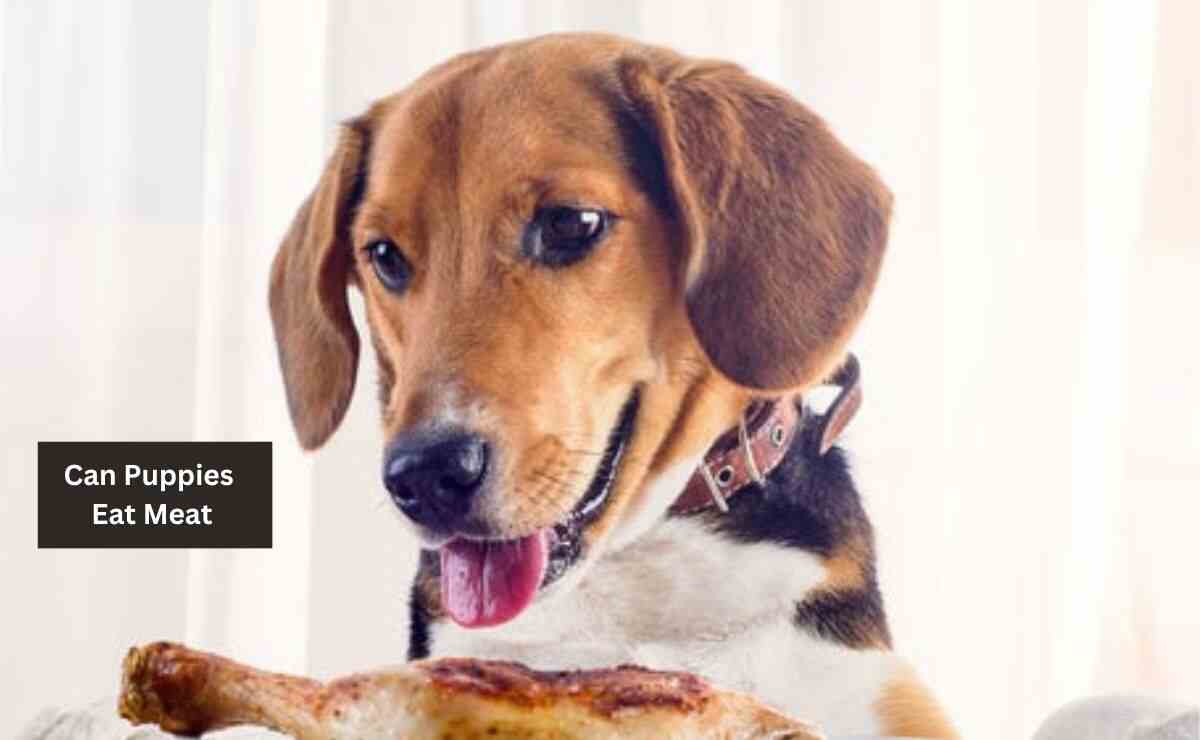A pup’s stomach is not as advanced as an adult’s. They need all the required nutrition to grow healthy. This way, every pet owner wants to know: can puppies eat meat?
Meat is full of protein content. So, I advise providing meat to your pup. However, you shouldn’t give only meat to your pup in the diet plan. Provide other food items so that your puppy gets all the necessary nutrients.
Meat, indeed, is one of the best products for pups. Learning what types of meat work best than others is crucial.
Can Puppies Eat Meat?

Technically, puppies can eat meat.
Puppies can easily digest meat, but that doesn’t mean meat is the best choice for each meal. Here the factor is that pups have specific nutritional requirements for their growth. Only meat is not the food item that can provide all the nutritional needs of a pup.
In this case, keeping your pup’s diet plan is best.
Now you might be wondering if I should give raw meat to my pup.
Well, there is a debate. Some prefer providing raw meat. The nutrients of raw meat remain intact, helping your pup grow stronger. When the meat is cooked, the nutrients break down. That is why some pet owner gives raw meat to their pup.
On the other hand, since the pup’s stomach is not as active as the adults, your pup may fail to digest the raw meat perfectly. In this case, cooked meat can be beneficial, helping your pup to digest the meat effortlessly.
With the above points in mind, I suggest combining the diet plan for your pup with raw meat and cooked meat. Also, add other food items, like apples, veggies, etc., to the diet plan. This will fulfill your puppy’s nutritional needs.
Another important thing is that if your pup has an upset stomach, consider consulting a vet. They will provide the best diet plan for your furry friend.
What are the Benefits of Eating Meat for Your Pups?
So, what benefits does meat offer to your pup? Nearly endless. Here are a few benefits most pet owners will experience after giving meat to their puppies.
- Improved Immune System: Many pet owners reported that they had seen fewer illnesses once they started providing meat to their pups. Meat consists of fat, protein, etc., helping a puppy to grow stronger. At the same time, meat improves the immune system by boosting gut bacteria.
- Protein: Protein is a crucial source for pups. Metabolism and oxygen transportation gets boosted due to protein. Also, the pup’s health is promoted because of the amino acid available in the protein. Meat ensures that your puppy receives the required protein.
- Fat: You will notice a playful pup after providing meat in their meal. It is because meat provides necessary energy so your puppy can get important fuel for play and exercise. However, excessive fat can let your pup gain weight. Also, too much meat can cause cardiovascular problems and other health issues. So, add meat to your pup’s meal slowly.
- Vitamins & Minerals: Meat are rich in vitamins and minerals, including vitamin A, B, C, D, E, and fatty acids. Also, meat is an important source of manganese, phosphorus, selenium, copper, zinc, calcium, and potassium. All these vitamins and minerals are a great way for the health of your pups.
- Other Benefits: Want to give your pup a shinier and stronger coat? Add meat to the diet plan without fail. Meat also helps your pup to build muscle tone. Simultaneously, raw meats promote dental hygiene, digestion, and muscle strength.
How to Prepare Meat for Your Pup?
Preparing the meat for your pup is significantly vital. Your pup can get the best benefit from the meat when prepared perfectly. Here are the steps.
Step 01: Remove any bones from the meat thoroughly and carefully. A tiny piece of bone can create problems in the digestion process of your pup.
Step 03: Rinse the meat until you are satisfied. This will remove chemicals that are used for preservation. Also, the meat will be cleaned.
Step 04: Make sure not to season the meat. Seasoning can become uncomfortable for your pup. Also, don’t use butter in the meat.
Step 05: Cook the meat thoroughly. Medium heat is the best as it helps you avoid any potential salmonella poisoning.
Important Note:
- Remove fat as much as you can before and after the cook. Fat can be lodged in your pup’s throat, causing choking.
What are the types of Meat that are Safe to Feed Pups?
You must be thinking, can I feed my pup any meat? This is a common question asked by many pup owners. Find the answer below.
- Chicken: One of the common meats for pups is chicken, and it is for good reasons. Chickens have lots of protein which can be helpful for the building of your pup’s overall well-being and health. Also, chicken meat supports shiny coats, stronger bones, healthy skin, etc.
- Beef & Steak: Another source of nutrition for your puppy is red meat, aka beef and steak. Red meat supports muscle tone and joints as it contains fatty acids. Moreover, red meat is a great source of Omega 6.
- Lamb: Lamb is also categorized as red meat, which is tasty for every pup. Dietary fats are the prime ingredients of lamb meat, helping your pup maintain a shiny coat, strong muscle, and silky fur.
- Turkey: Turkey is also a safe food for puppies. It consists of highly digestive protein, maintaining and supporting muscle.
In addition, you must give your pup the below meat items
- Bologna
- Sausage
- Hot dogs
- Rib bones
- All processed meats
Is It Safe to Feed Puppies Raw Meat?
Raw meat poses some health risks.
As per the FDA, feeding raw meats to your pup can be dangerous. Raw meat contains harmful E. coli, Listeria, Salmonella, and many more harmful bacteria. In this case, you must cook the meat thoroughly to remove these harmful bacteria.
If you cook raw meat to a safe temperature, these bacteria can easily be prevented. On the other hand, if you feed uncooked meat to your pup, foodborne illness can be developed. Also, they can cause different bacterial infections.
However, to feed your pup raw meat, consider following the precautions the FDA shares. Maintaining the precautions can minimize the risk of foodborne illness and contamination.
Frequently Asked Questions (FAQs)
Can pups be allergic to beef?
Although beef is safe for pups, it can be canine allergic. Frequent or repeated eating of beef can cause allergies. Moreover, your pup may feel discomfort if you feed them beef during every meal. Repeated eating can impact their digestion system.
More importantly, beef during every meal can stop them from eating. To avoid such incidents, balance your pup’ diet by consulting a vet.
When can puppies eat raw meat?
It is always best not to feed your puppies raw meat as a main meal. Puppies can have raw meat as their diet once they start weaning off their mother’s milk at the age of 3 – 4 weeks. Also, allow them to adjust to the new diet plan first. Once they are familiar, add meat to the meal.
Can puppies eat raw chicken bones?
Raw chicken bones can be good for puppies, but under supervision to avoid choking. Feed large enough meaty bones that can’t be swallowed easily. Also, remember not to feed cooked chicken bones as they are brittle and injure your pup’s digestive tract and mouth.
What is the raw diet for puppies?
Feeding uncooked meat, bones, and organs following a well-balanced portion to your pup is a raw diet. A perfectly maintained raw diet is not necessary for dogs of all ages, but it can be a good option for pups.
Raw diets contain necessary vitamins and minerals, protein, fats, and other useful ingredients, helping your pup to grow stronger.
Can puppies eat ham?
Yes, small doses. Make sure your pup is not getting habituated to eating ham. A high % of fat and salt is present in ham, increasing the risk of diabetes and heart disease. Consuming too much ham can cause vomiting and diarrhea. More dangerously, it can cause kidney damage and other illnesses.
Final Words
Puppies can indeed eat meat as part of their diet. As carnivorous animals, puppies naturally tend to consume meat to meet their nutritional needs. It provides them with essential proteins, fats, and amino acids crucial for their growth and development.
However, ensuring the meat is lean, cooked thoroughly, and free from bones or seasonings is important. Otherwise, it could be harmful to their digestive system. While meat can be beneficial to a puppy’s diet, it should be balanced with other essential nutrients.
Consulting with a veterinarian is always recommended to determine the specific dietary requirements of your growing puppy. Address any individual health considerations to the vet also.
